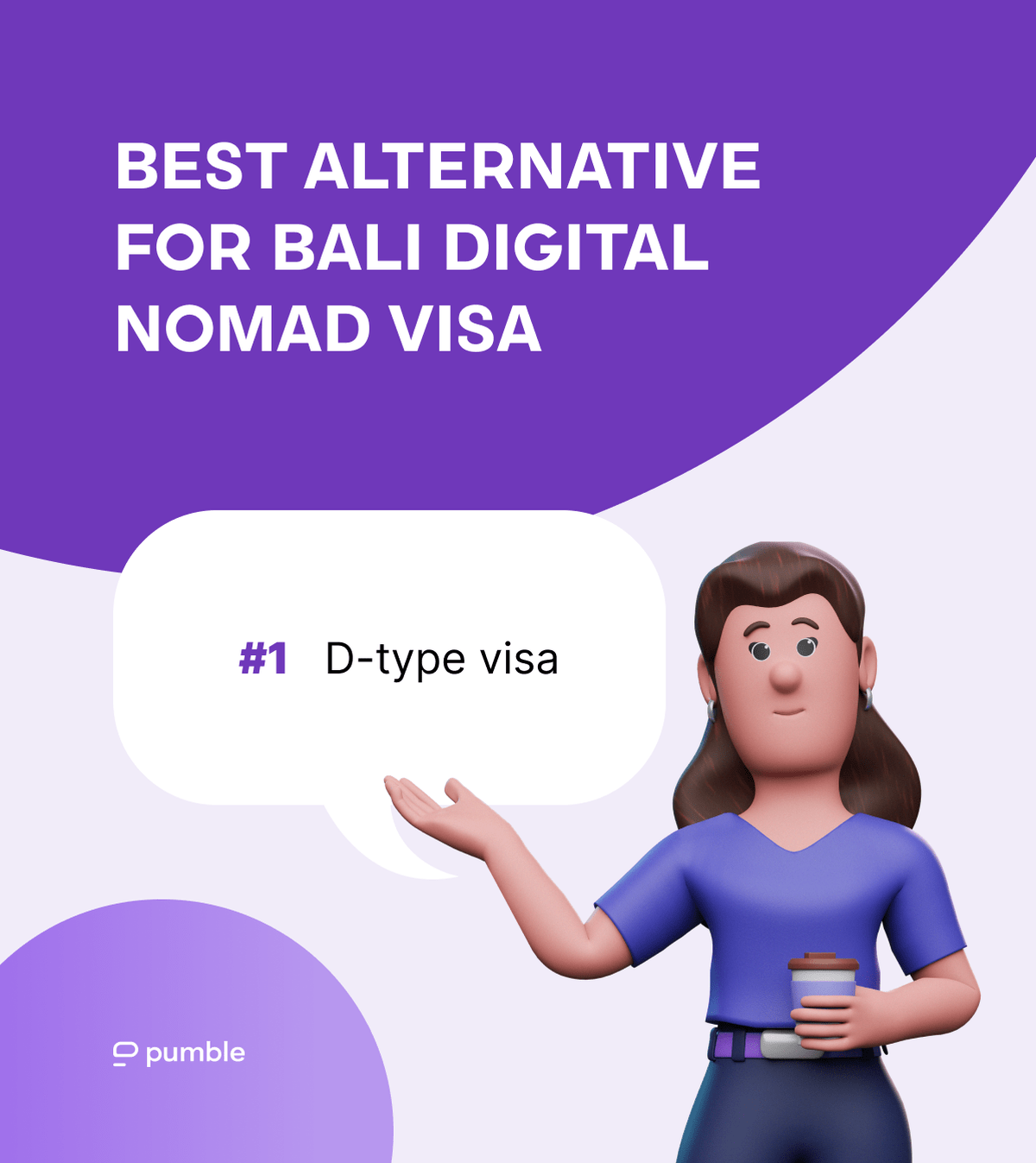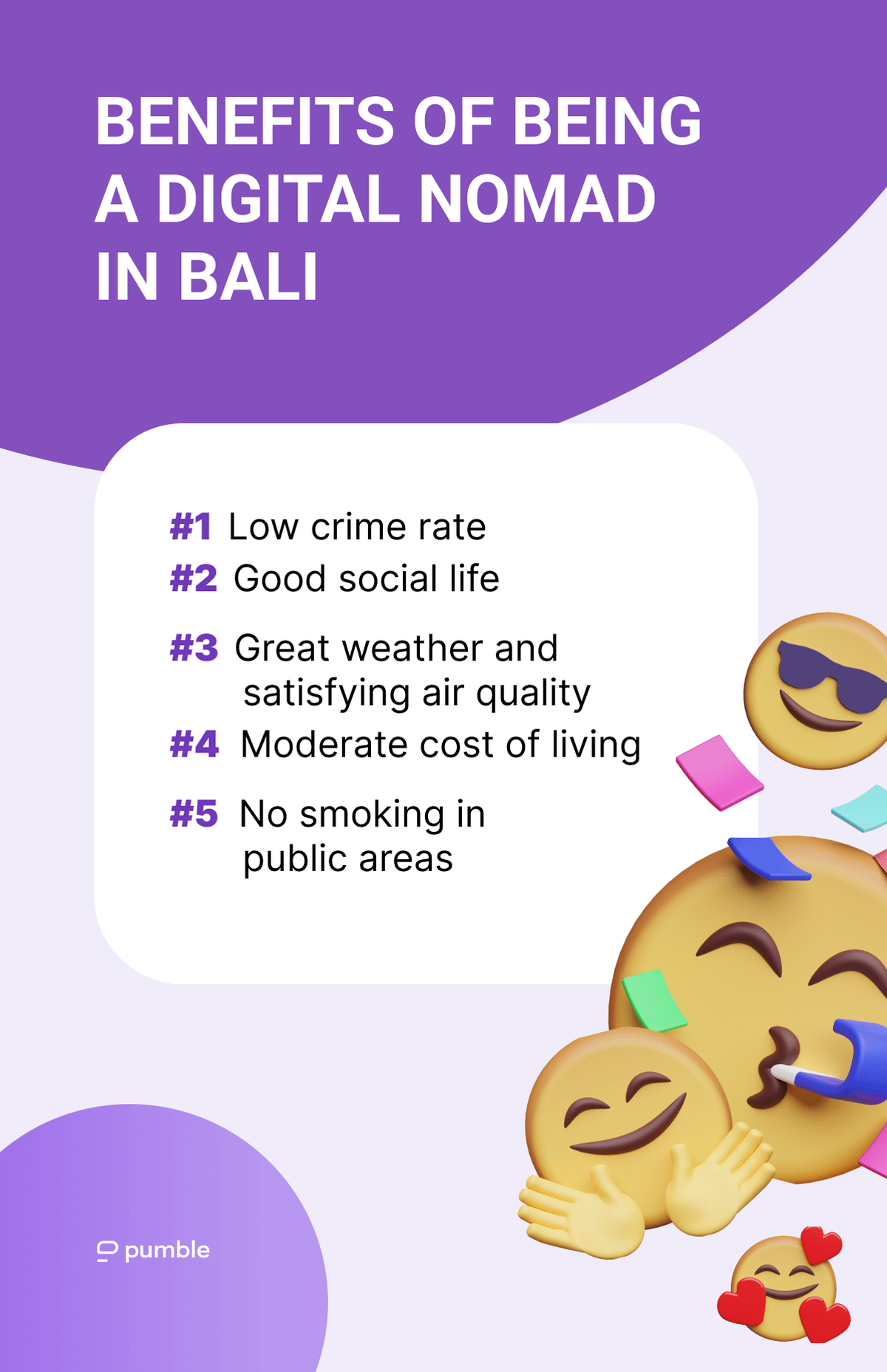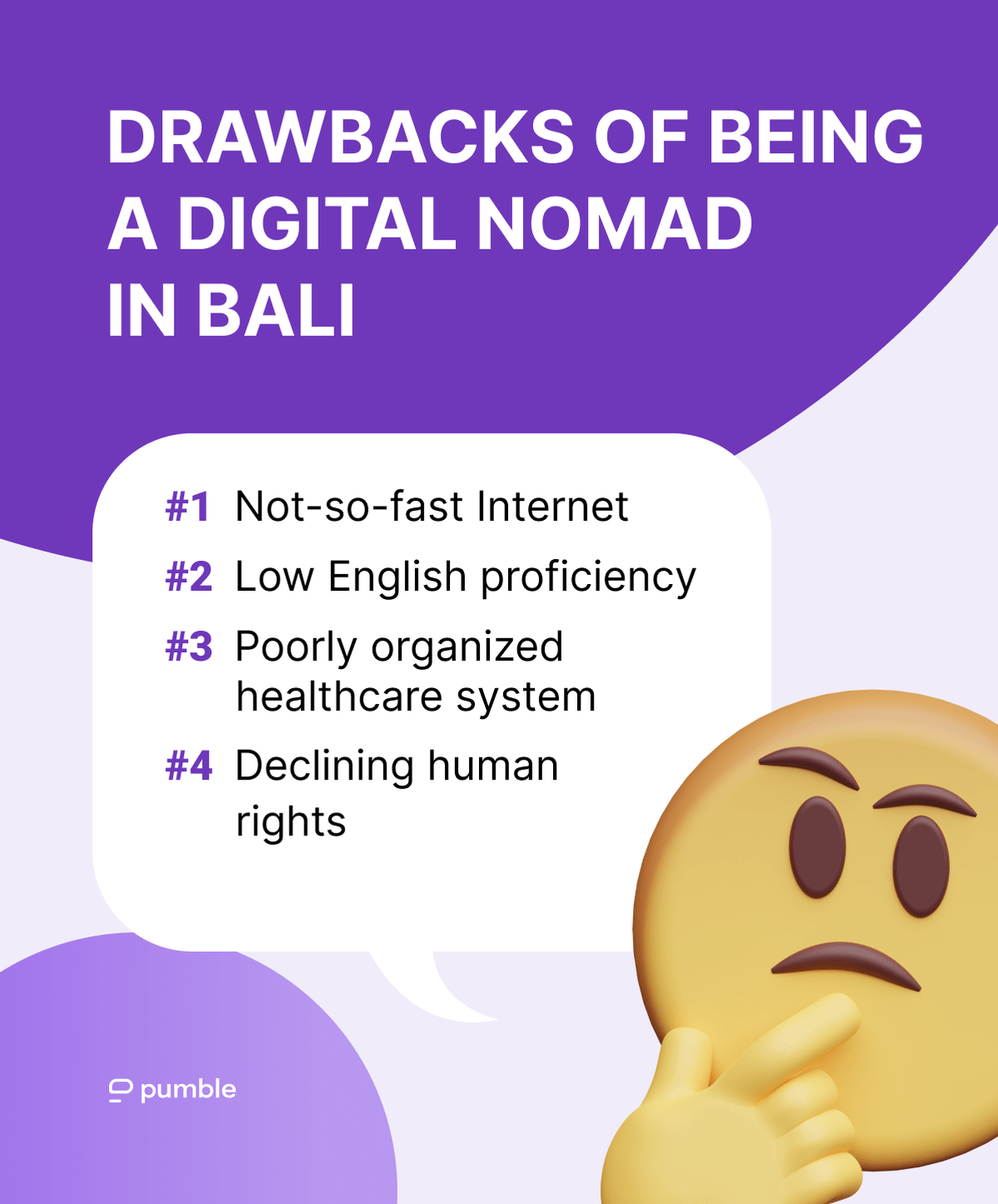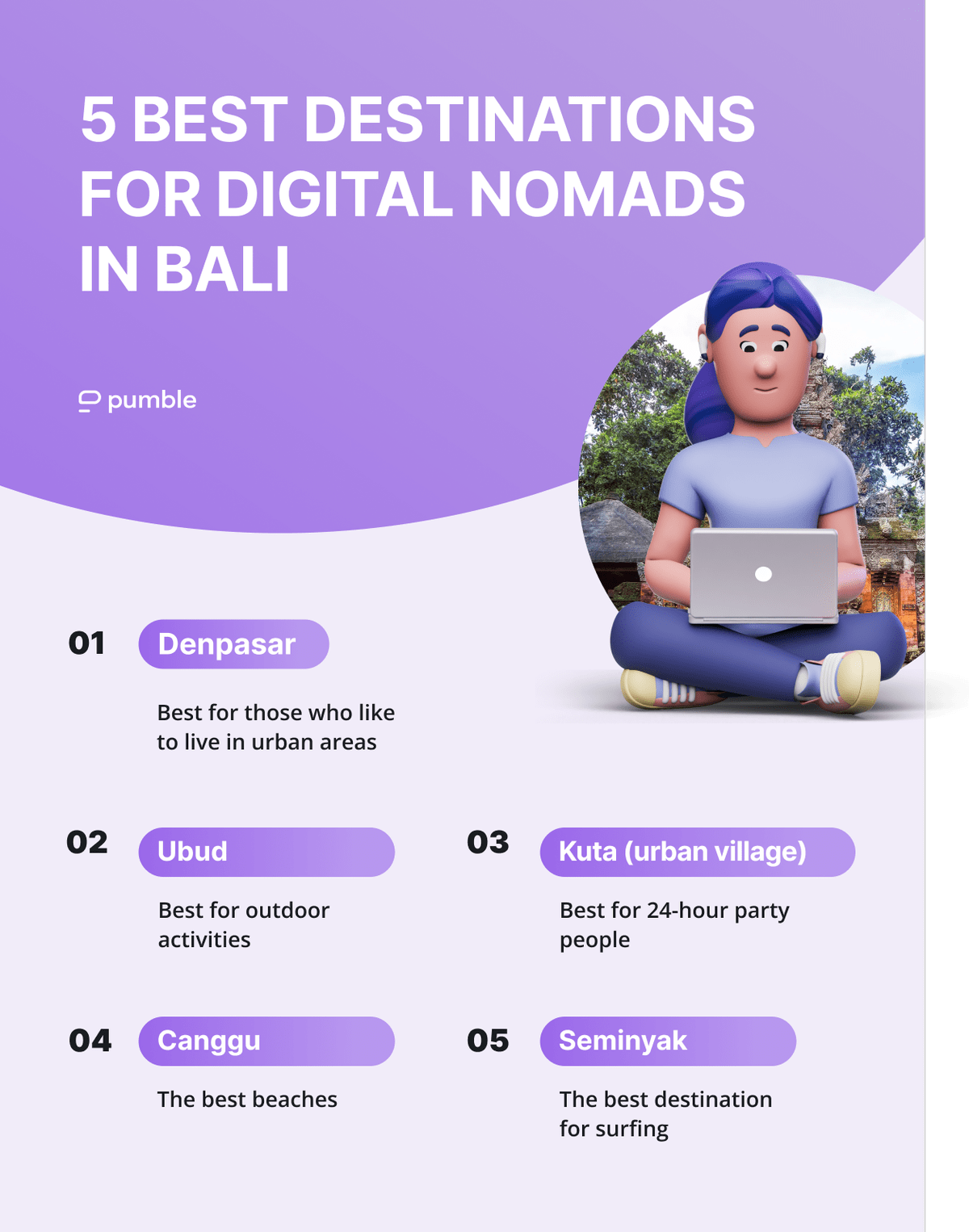For many years now, Bali has been one of the most popular tourist destinations. Just a single look at any of the pictures or videos is enough to make you instantly fall in love with it.
In the last decade, Bali has also become an expat hotspot, making it one of the most popular places for digital nomads in Southeast Asia.
But what is the secret of the Indonesian island nicknamed The Island of Gods that makes digital nomads flock to it?
In this article, we’ll answer that question by covering:
- The requirements for a Bali digital nomad visa,
- The process of becoming a digital nomad in Bali,
- Cost of living in Bali,
- Advantages and disadvantages of living in Bali, and
- The best destinations for digital nomads in Bali.
Let’s get you acquainted with everything you need to know, so you can start planning your trip to this beautiful island as a digital nomad.

Quick digital nomad visa facts for Bali
Here are some quick Bali digital nomad visa facts.
| Bali Visa Questions | Bali Visa Answers |
| Does Bali have a digital nomad visa? | There’s no visa called “digital nomad visa” in Indonesia, but these are the 2 most popular visa types among digital nomads in 2024: – The Bali Visit Visa C-type (also known as 211A visa) and – The E33G Remote Worker Visa (aka KITAS — temporary stay permit). |
| Who can apply for the Bali digital nomad visa? | – Anyone of non-Indonesian nationality who needs an Internet connection to work.* – Anyone who meets the other specific visa criteria (that we’ll talk about later in this article). *Certain nationalities aren’t allowed a visa; see chapter Common Restrictions And Requirements For Most Digital Nomad-Friendly Visas |
| How much does a Bali digital nomad visa cost? | – C-type Visa: Rp3,350,000 (~$205) – E33G Remote Worker Visa: Up to Rp15,000,000 (~$920) through a visa agency |
| Bali’s digital nomad visa length: | – C-type visa: 60 days (extendable up to 180 days) – E33G Remote Worker Visa: 12 months |
| Minimum stay requirement: | Not stated. |
| Possible to extend the visa: | C-type visa — yes, up to 180 days. |
| Minimum income requirements: | – C-type visa: $2,000/month (or equivalent) over the last 3-month period – E33G Remote Worker Visa: $60,000 per year |
| Processing time for visa application: | 4–8 working days after you have submitted proof of payment for visa fees. |
| Can I apply for a digital nomad visa with family members: | Yes, but only with your spouse/registered partner and children. |
What to expect as a digital nomad in Bali?
It’s good to know what to expect as a digital nomad in a foreign country. Here’s some information that will help you prepare for living in Bali.
| Bali Digital Nomad FAQ | Bali Digital Nomad Answers |
| Average Internet speed: | – Median download speed — 31.20 Mbps – Median upload speed — 18.82 Mbps |
| Best coworking space (highest Google rating and number of voters): | PUCO Rooftop Coworking Space & Eatery, Canggu (4,9 stars from 274 votes) |
| Friendly to foreigners: | Yes. Bali has been a popular destination for foreigners for a long time now, so the locals are used to people from all around the world. |
| The most popular place for digital nomads in Bali: | Ubud |
| Weather in Bali: | – Average annual temperature — 26,9°C (80,5°F) – Coldest month average temperature (January) — 26°C (79°F) – Hottest month average temperature (May) — 28°C (82°F) – Around 250 sunny days – Around 115 cloudy days |
| Type of climate: | Tropical |
| Annual air quality average: | US AQI 38 (Good) PM 2.5 — 2.1x the WHO annual air quality guideline value (unhealthy for sensitive groups) |
| Average cost of living: | Family of four: Rp37,322,234 (~$2,500) Single person: Rp19,771,893–Rp22,813,722 (~$1,300–$1,500) |
| Average coworking space cost: | Rp 1,632,398 (~$109) per month |
| Crime rate: | 51.12/100 |
| Interesting fact for digital nomads: | Bali has the highest number of digital nomads in Southeast Asia. |
Bali digital nomad visa
After many years of experiencing high levels of immigration, in 2024, Indonesia finally introduced suitable visas for digital nomads — although none of them are named exactly that.
Up until 2023, the visa most commonly used by digital nomads in Indonesia was the Second Home Visa. However, because of the substantial ”proof of funds” requirement — the visa applicants had to have Rp2,000,000,000 or around $122,560 in their bank accounts — not many digital nomads could acquire it.
Thus, the Second Home Visa has been decommissioned and the online application and requirements have been removed from the immigration website.
In 2024, there are 2 types of visas most commonly offered to digital nomads by various visa agencies operating in Bali:
- The Bali Visit Visa C-type (commonly known as 211A visa), and
- The E33G Remote Worker Visa (aka KITAS — temporary stay permit).
Let’s explore what these 2 types of visas have to offer so you can make an informed decision and choose the best visa for your specific situation.
Types of Bali digital nomad visas
Let’s take a look at the visas suitable for digital nomads in Bali.
Bali Visit Visa C-type (the B211A visa)
The B211A visa is one of the most popular solutions for digital nomads looking to stay in Bali, mostly because it’s easy to acquire.
This is a single entry visa — if you leave the country at any point while holding this visa, it will become void, and you’ll have to apply and pay the fees for a new one.
The Bali Visit C-type visa is best suited for:
- Self-employed digital nomads, and
- Digital nomads looking to stay in Bali for up to 180 days.
Main things to know about the C-type visa:
- There are different options, depending on your travel purpose (e.g. C1 Tourism, C2 Business, C6 Voluntary Program, C12 Pre-Investment, etc.) — all of them are valid for 60 days initially.
- There is a Rp2,000,000 (~$123) fee each time you extend your visa.
- The days of arrival and departure both count as full days.
- This type of visa can be extended twice, each time for 60 days for a total of 180 days, which is the maximum stay allowed on this type of visa.
- There’s a penalty of Rp1,000,000 (~$62) for each day you overstay your visa.
The primary requirements for the C-type visa are:
- A passport that should be valid for at least 6 months after your arrival date,
- A personal bank statement that includes your name, exact period with dates, and the balance in your account, showing that you’ve earned at least $2,000 (or the equivalent of that in another currency) per month for the past 3 months, and
- One recent color photograph.
We highly recommend contacting relevant authorities for further details on the exact type of visa for your specific case.
E33G Remote Worker Visa — KITAS
The E33G Remote Worker Visa is suitable for remote workers and digital nomads. However, it is NOT suitable for freelancers and self-employed workers. This type of visa requires you to be formally employed by a non-Indonesian company.
This visa allows you to work for a non-Indonesian company from Indonesia, without having to pay any taxes to the Indonesian government.
Just like the C-type visa, this is also a single entry visa, so you won’t be able to leave the country without having to apply for the visa again.
The E33G visa is best suited for:
- Formally employed remote workers who are working for non-Indonesian companies.
Main things to know about the E33G visa:
- You can stay for up to 1 year (provided you don’t leave the country), and
- The total cost of acquiring the visa (if going through an agency) is up to Rp15,000,000 (~$920).
The requirements for E33G Visa are:
- A passport that should be valid for at least 6 months after your arrival date,
- A personal bank statement that includes your name, exact period with dates, and the balance in your account, showing that you’ve earned at least $2,000 (or the equivalent of that in another currency) per month for the past 3 months,
- One recent color photograph,
- Your CV,
- Proof of a bank account that shows income in the form of salary of at least $60,000 per year, and
- Employment contract with a company established outside Indonesia.
Important:
- This visa must be used to enter Indonesia within 90 days from the issuing date.
Benefits of the E33G Remote Worker Visa (KITAS)
Once you acquire your E33G visa, you’ll be granted a KITAS. KITAS stands for “Kartu Ijin Tinggal Terbatas” (temporary residency stay permit card).
The E33G Remote Worker Visa and KITAS are two different things acquired through the same process, so for all intents and purposes, many agencies treat them as the same thing. A KITAS is issued along with the E33G visa.
KITAS comes with a lot of perks. It allows you to:
- Get a local driver’s license,
- Buy vehicles registered to your name,
- Obtain local insurance, and
- Open an Indonesian bank account.
However, you should keep in mind that holding a KITAS comes with responsibility as well.
By becoming a temporary resident of Indonesia, you also become an Indonesian tax resident. All Indonesian tax residents need to apply for their NPWP (Nomor Pokok Wajib Pajak, which is a Tax File Number) at the local tax office and must file an annual tax report (usually in March).
We strongly advise you to check in advance with your local embassy or consulate how this relates to your business with non-Indonesian companies, since specific details aren’t easily available.
In general, your income from non-Indonesian companies shouldn’t be taxed. However, we still advise you to double-check this just in case.
To get accurate specific details, a good option would be to contact a reputable visa agency from Bali and a local tax consultant once you get there.
Other formal expenses for Bali digital nomads
Aside from the initial fees, there are also other fees for additional documents or services that you may have to pay during your stay in Bali:
- Extension of the Visa or KITAS — the price varies depending on your visa type,
- SKTT (Surat Keterangan Tempat Tinggal which is the Domicile Letter) — Rp2,000,000 (~$123),
- EPO (Exit Permit Only) when you decide to leave Indonesia for good. This permit ensures that all documents are returned to the immigration office and that your name is cleared from the immigration records — Rp1,500,000 (~$92), or
- Change of passport information such as your address in the immigration office — Rp1,000,000 (~$62).
How do I get a digital nomad visa for Bali?
The process of getting a digital nomad visa in Bali can seem a bit overwhelming at first. Let’s break it down into simpler steps so that you can grasp the entire process easily.
Visa application process
After you have met all the visa requirements for Bali and gathered all the necessary documents, it’s time to apply.
You can apply online at this link, or you can visit your local embassy and submit your application on the spot.
After that, all you can do is wait.
It is still not clear how long that process takes, but the general consensus is that you can expect an answer within 4 to 8 working days.
Once your application gets approved, you’ll be given specific details of how you can obtain your visa.
Most Indonesian visas are issued online so you don’t have to worry about getting a physical visa, even when going through e-gates at airports. After going through the Indonesian border and scanning your passport, you’ll receive an email containing a PDF form — an e-KTE, which is your Visa Stay Permit. This acknowledges your arrival in Indonesia.
Things to keep in mind before applying for a Bali digital nomad visa
NOTE: Because Bali is such a popular digital nomad destination, many agencies dedicated specifically to simplifying the visa process for foreign digital nomads have opened in Bali in recent years. If you decide to acquire your visa through an agency, apart from the visa fee, you should expect additional fees (but an overall simpler process).
However, keep in mind that not all agencies are reliable and secure — you might even run into scammers. Our recommendation is to thoroughly check the website, the agency’s reputation, as well as previous client experiences with an agency you’re looking to contact.
Before going over the visas themselves, let’s take a look at the most important things to know before going to work as a digital nomad in Indonesia.
Onshore and offshore visas
If you’re planning to get a visa for Bali you can do so offshore (before you arrive in Indonesia) and onshore (after you’ve arrived in Indonesia).
However, your best bet is to go for an offshore visa and get acquainted with all of the details of your particular visa type before you arrive, so as not to leave anything up to chance.
Common restrictions and requirements for most digital nomad-friendly visas
There are a few requirements and restrictions that you should keep in mind, no matter the type of visa you apply for:
- You are prohibited from working with any companies inside Indonesia — you can only be paid by non-Indonesian companies,
- You can’t rent or sublease your room to anyone — this can count as income from Indonesia and can even lead to deportation,
- You must have sufficient funds in your bank account (the actual amount depends on the particular visa you select and apply for), and
- You are expected to respect the local culture and customs.
It should also be noted that citizens of certain countries can not apply for Tourist/Visit visas due to certain restrictions. These countries include:
- Afghanistan,
- Bangladesh,
- Guinea,
- Israel,
- Kosovo (not recognized),
- Liberia,
- Nigeria,
- North Korea, and
- Somalia.
For more information, you’ll have to directly contact an embassy or consulate in your home country.
With these things covered, let’s move on to the details of the visas for digital nomads in Bali, and how you can secure them.
🎓 Pumble Pro Tip
Becoming a digital nomad and acquiring a digital nomad visa often requires a lot of meetings and calls. If you get nervous or anxious before important meetings, this Pumble article might help:
What other types of visas suitable for digital nomads does Bali offer?
There’s one other type of visa we’d like to bring to your attention — the D-type visa. It’s ideal if you’re planning to stay in Bali for longer periods with occasional visits back home because it allows you to do so without having to go through the trouble of getting a new visa every time you need to enter Indonesia again.
Multiple Entry Visa For Bali: D-type Visa
The D-type visa allows you multiple entries into Indonesia over a period of 12 months.
This is a great option if you plan to visit Indonesia multiple times a year and if you need to stay around 60 days at a time. The maximum amount of time you can stay in Indonesia at once with this visa is 180 days.
However, just like the C-type visa, the D-type visa can be extended. You can do so up to 2 times, each time for 60 or more days.
There are different subtypes of the D-type visa. We’ll cover the application process for the D1 visa (individuals visiting Indonesia for tourism, family visits, or participation in events such as meetings, incentives, conventions, and exhibitions). Other D-type visa subtypes have similar requirements, but we advise you to check which visa sub-type best fits your situation.
D-type visa requirements (a D1 Visa Example):
- A passport that should be valid for at least 6 months after your arrival date,
- A personal bank statement that includes your name, exact period with dates, and the balance in your account, showing that you’ve earned at least $2,000 (or the equivalent of that in another currency) per month for the past 3 months,
- A recent color photograph, and
- Information, invitations, or correspondence from government agencies or private institutions that explain the relationship with the applicant (Sponsor, Invitation, Or Guarantor Letter) — different visas require different types of letters, so you’ll have to check which ones you’ll need.
It’s important to note that this type of visa cannot be converted into any other type of visa. Also, it must be issued offshore (before you arrive in Indonesia).
You can do the whole application process online via the online visa approval application website. After the Indonesian authorities confirm that your documentation is complete, you will have to pay immigration fees, and, eventually, your visa will be issued.

Unfortunately, not all of the things are super clear, and certain requirements may vary because of frequent visa policy updates. So, keep in mind that you should check the specific details regarding the visa type that’s best for your situation via official channels — by contacting your local Indonesian consulate or embassy.
We strongly advise you to do this before arranging your trip (accommodation, reservations for hubs, jobs/clients, etc.).
Which Bali visa type is best for digital nomads?
The best visa type for digital nomads in Bali will vary depending on your specific situation, purpose of travel, and short-term as well as long-term needs. In short, there are 3 suitable visa types common for digital nomads in 2024:
- C-type visa (or B211A) — for self-employed workers planning to work 60–180 days from Bali,
- E33G visa — for workers formally employed by a non-Indonesian company, working remotely from Bali for up to 180 days, and
- D-type visa — for multiple entries to Indonesia over a period of 12 months.
In any case, before you apply for any of these visas, we once again recommend you contact the Indonesian embassies/consulates or reliable Bali agencies specialized in migration so that you know for sure which Bali remote work visa is best for you.
🎓 Pumble Pro Tip
If you don’t like the above-mentioned alternatives for the Bali digital nomad visa, you might be interested in what some other countries have to offer:
Costs you need to consider as a digital nomad in Bali
There are many rumors that the cost of living in Bali is extremely high and that it is a place only affordable to rich people.
We can say that those rumors are partially true.
Bali has plenty of well-off residents, but what makes it unique is that even people who are not millionaires can find their place under the Balinese sun.
How is that possible? Well, let’s take a closer look at all the potential expenses you might have in Bali as well as the cost of living there, and everything will be clear.
🎓 Pumble Pro Tip
Moving to another country is demanding. One of the things you might need is enough money to finance your trip and potential expenses.
Therefore, you might ask your business partners or managers for an advance payment. To help you do that in the right way, we have created the following article:
Expense #1: Accommodation
Hmm, let’s see, how expensive can it be to find accommodation on the island that has the nickname “The Island of Gods”?
Well, according to the data available, Gods were economical when choosing their place of living because the accommodation prices in Bali are moderate.
Yes, we would expect accommodation in one of the most visited destinations in Asia to be more expensive, but the truth is you can find well-furnished 1-bedroom apartments from around Rp8,969,186 (~$600).
For slightly more money, you can even rent apartments in complexes that have amenities such as pools or gardens.
Another popular option among digital nomads in Bali is to rent a villa, but, for that, you will need either a higher salary or a few roommates willing to spend slightly more for accommodation.
In any case, let’s take a look at the average prices of 1-bedroom apartments in Bali’s most popular areas.
| Place In Bali | Accommodation Costs |
|---|---|
| Denpasar | Rp8,969,186–Rp11,958,915 (~$600–$800) |
| Canggu | Rp8,969,186–Rp11,958,915 (~$600–$ 800) |
| Ubud | Rp8,969,186 (~$600) |
| Kuta | Rp8,969,186 (~$600) |
| Seminyak | Rp8,969,186–Rp10,464,050 (~$600–$ 700) |
Also, bear in mind that the prices of accommodation in Bali can vary depending on the number of tourists. Therefore, if you’re looking for a bargain, it would be best to rent an apartment during the off-season, when there are fewer visitors — somewhere between October and February.
Expense #2: Groceries
Prices of groceries in Bali are similar to those in Europe or Northern America.
Like almost every country in the world right now, Indonesia has been coping with inflation for some time, but it seems that food and drink prices are steady for now, and will remain the same in the future.
To give you a better picture of prices in Bali, we have made a list of the average prices of some most often-bought groceries.
| Groceries | Grocery Prices In Bali |
|---|---|
| Bread | Rp23,375 (~$1.45) |
| Water 1.5 l (50.721 fl oz) | Rp12,432.43 (~$0.77) |
| Milk 1 l (33,8 fl oz) | Rp28,689.84 (~$1.77) |
| Chicken breasts 1 kg (2,2 lbs) | Rp60,875 (~$3.76) |
| Cheese 500 g (1,1 lbs) | Rp121,800 (~$7.53) |
| 12 eggs | Rp27,108.15 (~$1.68) |
| Rice 1 kg | Rp15,500.00 (~$0.96) |
| Apples 1 kg | Rp47,182.72 (~$2.55) |
| Oranges 1 kg | Rp43,469.77 (~$2.69) |
| Tomatoes 1 kg | Rp31,736.46 (~$1.96) |
| Potatoes 1 kg | Rp23,775.71 (~$1.47) |
Expense #3: Utilities
We would be thrilled to say that Bali’s second nickname is “The Island of Free Utilities”, but, unfortunately, it is not.
According to available data, the current electricity price in Bali is Rp1,447 (~$0,097) for 1 kWh of power. So, if you spend, for example, 100 kWh of electricity, you need to pay Rp144,776 (~$9,7).
According to the available data, the price of 1m3 of water in Bali is Rp1,900 (~$0,13). However, the price increases with the higher water expenditure, so we recommend you always keep an eye on the water prices in Bali to know how much you need to pay.
Since it is almost always sunny in Bali, there is no need for heating there. However, during the monsoon season, the temperatures might decrease, so you might have to turn on the AC to warm up your place a bit.
Also, depending on how organized the neighborhood where you live is, you might need to pay for some additional bills for cleaning or garbage disposal.
Therefore, we recommend asking the landlord or your real estate agent about additional expenses before renting a place in Bali.
Expense #4: Gas and public transportation
Bali is a beautiful island ripe for exploring. To do that, you’ll need to buy or rent a motorbike or a car. Let’s see how much money you will spend on gas.
| Fuel Type | Fuel Cost In Bali |
|---|---|
| Diesel | 17,163 Rp/l (~$1,15/l) |
| Petrol | 19,849 Rp/l (~$1,33/l) |
| Auto Gas | 6,268 Rp/l (~$0,42/l) |
| LPG | 203,120 Rp/14,2 Kg cylinder (~$13,61/14,2 Kg cylinder) |
Unfortunately, public transportation in Bali is not at the same level as transportation in Europe, North America, or some more developed Asian countries.
That’s why we recommend renting or buying a car if you plan to go to other places or distant areas. Even getting a taxi is better than riding on Bali buses.
However, if you still want to travel by bus, you need to pay around Rp5,000 (~$0,33) for a bus ticket.
“Not much“, you might say. But the price isn’t the problem — the discomfort and low quality of buses are.
Expense #5: Bars and restaurants
Bali, along with Thailand’s capital Bangkok, is the Asian nightlife capital.
Since Bali is almost always packed with tourists from all over the world, it has an abundance of restaurants, bars, and clubs that have something for everyone.
If you are a fan of the fine dining concept, you will be amazed at how many fine dining restaurants Bali offers. A meal in one of those restaurants costs anywhere between Rp224,081–Rp746,937 (~$15–$50), depending on what you eat and drink.
On the other hand, wandering in Bali street markets might lead you to some Balinese street food specialties, for which you need Rp22,408–Rp37,346 (~$1,5–$2,5). Since Southeast Asia is famous for its delicious street food, it would be a pity not to try it while living and working in Bali.
Having a drink in a local bar, pub, or club is a great way to meet new people, whether they are locals or Bali digital nomads. Therefore, we recommend you visit some of them.
Here are the average prices in Balinese bars.
| Drinks | Drink Prices In Bali |
|---|---|
| Domestic Beer 0.5 liter (16,9 fl oz) | ~Rp29,939 (~$1.85) |
| Pepsi/Cola 0.33l (11.15 fl oz) | ~Rp18,847.87 (~$1.17) |
| Cappuccino | ~Rp38,023.76 (~$2.36) |
| Juices 0.33l | ~Rp26,648 (~$1.65) |
| Liquors | ~Rp104,571–Rp164,326 (~$7–$11) |
Take into account that Bali is a tourist hotspot and, because of that, the prices can vary.
Expense #6: Coworking spaces
If you like to work with other digital nomads, finding your favorite Bali coworking space might be difficult because there are many great places, especially in the Denpasar area.
Furthermore, having a desk in some of those coworking places is not expensive at all, bearing in mind the prices in some other countries popular among digital nomads.
According to the available data, the average price of a desk in Bali coworking spaces is anywhere between 3 and 20 dollars per day. There are, of course, discounts for monthly and annual memberships.
Expense #7: Internet
The average Internet price in Bali is around Rp522,856 (~$35) per month.
For example, if you purchase the Biznet home Internet package, whose speed can go up to 300 Mbps, you’ll need to pay Rp700,000 (~$43). In addition, you will get IPTV, which has many American and European channels.
On the other hand, if you check what GlobalXtreme, one of the most popular Indonesian Internet providers, has to offer, you’ll see that their home Internet package (Lite 2 plan, 200 Mbps) costs Rp500,000 (~$31) per month.
Other providers such as D-Net or Blueline offer similar packages for almost the same price.
Do digital nomads pay tax in Bali?
No, digital nomads do not have to pay taxes in Bali since they do not work for an Indonesian-registered company but for a company registered abroad.
You will have to pay taxes in this Southeast Asian country if you eventually get a job in some Indonesian registered company (with an Indonesian work permit).
However, if you get a KITAS visa, you may be required to register at a local tax office. Make sure to check with local agencies when you arrive.
Also, keep in mind that even though you are exempt from taxes as a remote worker in Bali, you must pay taxes in a country where you are either registered as a citizen or have a designated tax number.
We strongly recommend visiting some of the accredited tax and accounting service offices after arriving in Bali to get more first-hand information, because it varies between different types of visas and policies are subject to change frequently.
What are the benefits of being a digital nomad in Bali?
We always like to start with the positive aspects of being a digital nomad in a certain country or area.
The benefits (as well as the drawbacks that we’ll discuss later on) can give you a more detailed picture of the place where you plan to live — and possibly help you decide whether a certain place is for you or not.
So, let’s waste no more time and learn more about the main benefits of being a digital nomad in Bali.

Benefit #1: Low crime rate
You can feel safe as a foreigner in Bali.
Bali has been a tourist hotspot in Southeast Asia for a long time now, and locals are used to tourists — and they are pretty friendly to them as well.
The latest data about the Bali crime rate shows a score of 51.12 out of 100. That crime rate is considered moderate.
However, as in most cases, crowded and popular destinations are fertile grounds for pickpocketing and petty thefts. Therefore, we recommend keeping your belongings somewhere safe and carrying only essential items.
Also, beware of credit card frauds. Most often, those frauds happen when criminals place skimming devices on ATMs. Hence, if you see anything suspicious at an ATM, avoid using it.
Finally, when you go out, watch out for drink spiking that might happen occasionally. We recommend you hang out at places that have a good reputation among tourists and foreigners.
Overall, if you take the “necessary precautions” we mentioned, you will not have to worry about your safety in Bali.
Benefit #2: Good social life
Social life in Bali is a mixture of traditional and contemporary cultures. Therefore, there is something for everyone.
After you arrive in Bali and spend some time meeting Balinese people, it won’t take long before you notice their friendliness and hospitality towards foreigners.
The Balinese are incredibly talented at art. And, since they are friendly, you can ask them to show you the local art. You will undoubtedly enjoy observing various sculptures, temples, paintings, and even local conceptual art.
Secondly, Balinese people have preserved local customs and traditions.
Therefore, we recommend you observe their traditional ceremonies, such as Galungan, which celebrates the triumph of good over evil, whenever you have an opportunity.
After all, that is a once-in-a-lifetime opportunity to see the local people’s traditions, which you will probably remember for the rest of your life.
Finally, one of the contemporary phenomena that flourished in Bali is nightlife. A lot of buzzing places to go out, combined with the friendliness of the locals and curiosity of other digital nomads and professionals from abroad, can often result in nights to remember.
All these opportunities to socialize and enjoy local culture make Bali a unique place we are sure you will enjoy.
🎓 Pumble Pro Tip
If you like to socialize and meet new people in the workplace, we recommend you check out the following article:
Benefit #3: Great weather and satisfying air quality
The weather in Bali is perfect.
You can enjoy swimming and sunbathing over the whole year.
Even though monsoons might appear from time to time, they mostly bring strong winds without rain. Occasional downpours can happen, but, in most cases, they last only for about an hour.
After that, you can continue enjoying the Island of Gods’ sunny weather and lovely beaches.
Although Indonesia has low air quality, Bali is an exception. Bali has moderately good to satisfying air quality.
Namely, if you take a look at Bali’s air quality, you will notice that most Balinese cities have air quality labeled as “good”.
Naturally, some cities occasionally have slightly worsened or “moderately good” air quality due to their proximity to the terrestrial parts of Indonesia where some polluting industries are located.
However, it is not something that should worry you too much because the air quality in Bali is much better compared to some other parts of the world and Southeast Asia in particular.
Benefit #4: Moderate cost of living
As you have seen above, the cost of living in Bali is moderate.
That means that a digital nomad who holds a Bali digital nomad visa or its alternatives can enjoy a great life on this Indonesian island for around Rp19,771,893–Rp22,813,722 (~$1,300–$1,500) per month.
This amount includes apartment rent, utility bills, groceries, and the Internet.
Since the majority of digital nomads’ annual income is between $100,000 and $250,000, the expenses of living in this tropical paradise will be just a drop in the ocean for them.
Naturally, expenses might be higher if you come with your spouse or kids, but still, we believe that around Rp37,322,234 (~$2,500) is enough for a family of 4 to cover the basic needs and expenses in Bali.
Benefit #5: No smoking in public areas
Oh, non-smokers will like this!
Namely, one of the benefits of living in Bali is the fact that smoking is not allowed in most public places in Bali.
Finally, a Southeast Asian state where you don’t have to air out your clothes due to cigarette smell after going clubbing or hanging out in a restaurant. It goes without saying that smoking is also forbidden in religious or public buildings.
Also, holders of Bali digital nomad visas should be aware that it is not allowed to smoke and drive because of road safety.
However, since around 30% of adults in Indonesia are smokers (around 55 million people) and a lot of tourists who come to Bali like to smoke, there had to be some kind of compromise.
As a result, there are still some areas in public spaces, as well as in bars and restaurants, where people can smoke.
What are the drawbacks of being a digital nomad in Bali?
Although Bali is a tropical paradise with a lot of advantages, it has a few flaws as well.
Here you can see the main drawbacks of living in Bali as a digital nomad.

Drawback #1: Not-so-fast Internet
Although the Indonesian digital economy has been rapidly growing during the post-pandemic period, there are still some aspects that Indonesian authorities have to improve.
Namely, Indonesia’s average internet speed is still far behind the average speed in Singapore, Thailand, and Taiwan.
That’s understandable since Singaporean, Thai, and Taiwanese economies are some of the best in Asia. However, if Indonesian and Bali authorities want to make digital nomads choose Bali instead of, for example, Taiwan, they need to improve the average internet speed all over the country.
Building better internet infrastructure is the only way to increase it.
Since Bali has a decent internet infrastructure, you probably won’t have problems with the internet connection, but the internet speed will be lower than in the countries mentioned above. However, if you go to other, more rural areas of Indonesia, you will see problems with both connection and speed.
Slow internet? Try asynchronous communication over Pumble
Drawback #2: Low English proficiency
Unfortunately, locals’ English proficiency is not at the highest level.
According to the 2023 English proficiency rankings, the proficiency of Indonesians is labeled as Low.
Indonesia took 79th place among 113 countries and regions, which is pretty bad if you want to attract foreign digital nomads who mostly speak English as their first or second language.
However, since Bali is hugely popular among tourists, most locals in urban places have at least some English knowledge. So, don’t expect to have some big problems in communication there.
But, if you go to some other parts of Bali, off the beaten path, you might face communication barriers because the locals don’t know English very well or at all.
Therefore, whenever you travel to some rural places in inland Indonesia or Bali, we recommend you arm yourself with patience and find some alternative ways of communicating with the locals.
Drawback #3: Poorly organized healthcare system
As a digital nomad with health insurance, you have the right to use both public and private healthcare facilities in Bali.
However, since there is a huge discrepancy between how the Balinese public and private healthcare facilities are organized, we recommend you rely on private clinics and hospitals.
Private healthcare facilities are nicely organized, well-equipped, and have a lot of English-speaking personnel.
On the other hand, the public healthcare system in Indonesia lacks primary healthcare providers and capacities, and, compared to private hospitals, it is outdated. Furthermore, if you need to pay for treatment in most public facilities, you have to pay with cash.
There have been some advancements in the public healthcare system in Indonesia, such as the introduction of universal healthcare coverage in 2014, but it is not enough since the gap between private and public healthcare is getting bigger.
Drawback #4: Declining human rights
Although safety in Indonesia is satisfying, the recent decline in human rights is worrisome.
Due to recently adopted laws that restrict personal freedom, you cannot do the following things:
- Criticize authorities,
- Discuss religious matters in a way that someone might think of as blasphemous,
- Have extramarital sex, and
- Get married if you are a member of one of the sexual minorities.
These bans on rights and activities come as a surprise because, not that long ago, Indonesia was a democratic role model in Southeast Asia.
Nevertheless, times have changed, and now it is not so easy to be a member of a minority in Indonesia. As a holder of a Bali digital nomad visa or some of its alternatives, you should be aware of these facts.
However, since Bali has always been one of the most liberal areas in Indonesia, we doubt that police control regarding obeying the aforementioned rules will be as fierce as in other parts of Indonesia.
In any case, we hope Indonesian authorities will adopt new, more progressive legislation soon and that the current human rights crisis will be short-lived.
5 Best destinations for digital nomads in Bali
It is almost impossible to choose one single best destination for digital nomads in Bali because the choice depends on various factors — the most important one being the digital nomad’s personal preference.
However, there are a few destinations that the holders of Bali digital nomad visas will love the most.
Therefore, here are the 5 best destinations for digital nomads in Bali.

Denpasar — Best for those who like to live in urban areas
Population: 725,314
City area: 49.34 mi² (127.78 km²)
Time zone: UTC +8 (Indonesia Central Time)
Average internet speed: 30.35 Mbps (median download speed), 20.36 Mbps (median upload speed)
Average cost of living: around Rp17,854,804 (~$1,200) per month (with rent, groceries, and utilities)
Average cost of rent: Rp8,969,186–Rp11,958,915 (~$600–$800) per month for a 1-bedroom apartment
Biggest advantage: Cultural center of Bali
Biggest drawback: Might become overcrowded with expats at some point
Denpasar is the biggest city in Bali. It is the cultural and economic center of this beautiful island, so many expats choose it as their preferred destination.
The overall impression of Denpasar is that it is an open city with a lot to offer. It has something for everyone — from amazing landmarks and peaceful religious sights to contemporary buildings and streets bustling with tourists.
And, the most important thing is that it isn’t overcrowded. Yet.
Denpasar residents are mostly open-minded and believe in harmony and tolerance. Therefore, social and any kind of chauvinistic conflicts are almost non-existent.
There are plenty of things to do in Denpasar to “grease the social wheels”.
You can go out and enjoy the same food and drink as in Europe or Northern America, socialize with the locals or other expats living in Denpasar, or simply go out to local nightclubs.
However, it remains to be seen how the recently adopted laws will affect Denpasar’s social harmony and tolerance in the future.
If you are going to live and work solo from Denpasar, around Rp17,854,804 (~$1,200) per month will be enough to cover your basic expenses. It is a real bargain when you take into account all the possibilities you have in this beautiful provincial capital.
Where to work in Denpasar
There is a plethora of coworking spaces in Denpasar, but one that seems slightly better than the others is Biliq Seminyak Coworking Space and Meeting Venue. It has 4,8 stars from 241 votes on Google.
Ubud — Best for outdoor activities
Population: 74,800
City area: 16.36 mi² (42.38 km²)
Time zone: UTC +8 (Indonesia Central Time)
Average internet speed: 29.52 Mbps (median download speed), 19.43 Mbps (median upload speed)
Average cost of living: Rp14,879,003 (~$1000) per month (with rent, groceries, and utilities)
Average cost of rent: Rp8,969,186 (~$600) per month for a 1-bedroom apartment
Biggest advantage: Amazing nature
Biggest drawback: Unreliable transportation
Ubud is a town in central Bali that has developed into the new center of the island.
A mixture of tradition and modernity, Ubud quickly became a fan-favorite among tourists and digital nomads alike.
Due to the amazing nature that surrounds the city, the town is ideal if you want to hide from the madding crowd and work outside without being interrupted by hordes of tourists wandering around.
Still, if you want to live in slightly more urban areas, don’t worry. Ubud also has its urban parts where you will feel like you live in a big city with various shops, bars, hotels, restaurants, and coworking spaces at your disposal.
The biggest problem of living in Ubud is transportation.
Namely, intercity bus transport and taxi and transportation services such as Uber are not reliable north of Denpasar. So, if you need to go to other parts of Bali, the best thing is to have your own transportation.
If you decide to live in Ubud, expect to spend between Rp11,958,915 and Rp14,879,003 (~$1000–$1200) per month.
Also, what does living in a villa with a pool sound like? If it sounds good, check out the availability of villas for rent because they are often moderately priced.
Where to work in Ubud
Although Ubud is a town with only around 70,000 inhabitants, it has a plethora of great coworking spaces. The one that stands out is Outpost Ubud Coworking Space. It has an average rate of 4.8 from 220 votes on Google.
Kuta (Urban Village) — Best for 24-hour party people
Population: 20,228
Village area: 2.79 mi² (7.23 km²)
Time zone: UTC +8 (Indonesia Central Time)
Average internet speed: 36.99 Mbps (median download speed), 19.85 Mbps (median upload speed)
Average cost of living: Rp14,879,003 (~$1000) per month (with rent, groceries, and utilities)
Average cost of rent: Rp8,969,186 (~$600) per month for a 1-bedroom apartment
Biggest advantage: Popular among holidaymakers
Biggest drawback: Can be loud and overcrowded
You know the saying that beauty is a curse? Well, it makes sense if we take a look at Kuta.
The beauty of this coastal urban village has been attracting tourists from all over the world for decades. The first visitors to this settlement in the modern era were hippies in the 60s and 70s.
It was a real hippie gem back then, and that was just the beginning.
After a few decades, surfers noticed that the waves that splash the shores of Kuta are special and worth visiting. So, Kuta became one of the best places for surfers and those who want to try this extreme sport.
Finally, in recent years, along with surfers, a lot of holidaymakers who have a craving for parties and fun started to come to Kuta, making it one of the best party destinations in Indonesia.
Therefore, digital nomads who are ready to spend between Rp11,958,915 and Rp14,879,003 (~$1000–$1200) monthly for basic expenses and love to party would probably love this place.
On the other hand, if you prefer peaceful surroundings, you should look elsewhere.
Where to work in Kuta
Since Denpasar is close to Kuta, you can work in some of the most popular coworking spaces in the Balinese administrative center. However, if you prefer to stay in Kuta, you won’t be sorry because it has some pretty good hubs, as well.
According to Google, the best one is GoWork Park23 Coworking Space (4.8 stars from 152 votes).
Canggu — The best beaches
Time zone: UTC +8 (Indonesia Central Time)
Average internet speed: 24.69 Mbps (median download speed), 15.31 Mbps (median upload speed)
Average cost of living: Rp14,879,003 (~$1000) per month (with rent, groceries, and utilities)
Average cost of rent: Rp8,969,186 (~$600) per month for a 1-bedroom apartment
Biggest advantage: You have everything you need
Biggest drawback: Might become overcrowded with tourists and expats
The saying that beauty is a curse might be true in Kuta’s case, but not when it comes to Canggu.
For now, this small village of astounding beauty is still a hidden gem. However, it is getting increasingly popular, and we hope that won’t result in overpopulation.
If you’re a part of any digital nomad groups on social media you visit, you probably noticed that Canggu is one of the most discussed destinations. And, since we have done our research about it, we can understand why.
Imagine a place with a huge beach where you can:
- Cover basic expenses for as little as Rp11,958,915–Rp14,879,003 (~$1000–$1200) per month,
- Work in peace on sandy beaches,
- Enjoy fine dining and local specialties,
- Visit Sunday Market every week to buy local goods and souvenirs, and
- Surf.
Sounds good, doesn’t it?
If you get your Bali digital nomad visa and decide to live in Canggu, we recommend you do so before it becomes overcrowded with tourists and other expats.
Where to work in Canggu
Since Canggu has around 10 km of beach with an abundance of Wi-Fi-equipped bars, working outside has never been more alluring.
In case of bad weather, we recommend you try some of Canggu’s coworking places, such as Outpost Canggu Coworking (4.7 stars from 286 votes on Google).
Also, you might visit some of the coworking spaces in Denpasar, since it is pretty close to Canggu.
Seminyak — The best destination for surfing
Population: 4,256
Suburb area: 1.02 mi² (2.65 km²)
Time zone: UTC +8 (Indonesia Central Time)
Average internet speed: 27.36 Mbps (median download speed), 26.21 Mbps (median upload speed)
Average cost of living: Rp14,879,003 (~$1000) per month (with rent, groceries, and utilities)
Average cost of rent: Rp8,969,186–Rp10,464,050 (~$600–$700) per month for a 1-bedroom apartment
Biggest advantage: Well-organized
Biggest drawback: Might be too small
Seminyak is a settlement in the Kuta district, which (we believe) is currently the best destination for digital nomads in Bali and one of the places with the lowest average cost of living on the island.
Seminyak is also a place where you can find beautiful beach bars, restaurants, and shops. In other words, everything an expat needs.
If you want to go to a more urban place, Denpasar is only 10 km away. On the other hand, if you are longing for a crazy night out, Kuta is also pretty close.
Therefore, Seminyak is perfectly positioned.
Kuta and Seminyak are very close, and they’re both known for their surfer culture. Seminyak is the place where most people take up surfing — and if Seminyak doesn’t have good waves on a given day, Kuta just might!
The only problem is that Seminyak is small and, just like a few other cities on our list, in danger of overpopulation.
In any case, it is still our favorite destination due to its position, the aforementioned benefits, as well as its lively atmosphere, luxury amenities, bars, and beach clubs.
Where to work in Seminyak
Seminyak, Kuta, and Denpasar are so close to each other that you can easily commute from one place to another to work.
However, if you prefer to stay in the Seminyak area and work from one of the coworking spaces there, we recommend you check the Kembali Innovation Hub due to its high rating on Google (4.7 from 939 votes).
Tips for digital nomads in Bali
Bali can easily be your dream destination, but only if you know a few things about it before coming there.
To help you settle in the best possible way and avoid any potential pitfalls, here are the tips you should know.
Tip #1: Avoid using public transport
Unfortunately, if you plan to use public transport in Bali, we have bad news — it is almost non-existent. Yes, as we said above, there are old and dusty buses that represent some kind of public transport in Bali, but they are far from reliable.
We recommend you use public transport in Bali only if you want to meet the Balinese society better and get a unique experience of driving in probably the same buses as hippies from the 60s.
If you want to travel to other parts of Bali, we recommend using taxi services for nearby destinations and your own or rental car for longer distances.
Tip #2: Respect the religious beliefs of the locals
“Hmm, I have finally come to Bali, this paradise on earth where people are nothing but hospitable and friendly to me. What should I do first? Oh, I know! I’ll pose naked in front of their sacred sites, they will surely like that!”
Believe it or not, some people think like this. As a result, it is not uncommon for tourists to pose naked in front of Balinese religious sites. Naturally, that angers the locals and creates a gap between foreigners and locals — a gap that is not good for anybody.
Therefore, we urge you not to go full-monty in front of sacred sites and respect the religious beliefs of the locals.
Tip #3: Visit as many places as you can
Some would say, “Visit one place in Bali, and you have seen them all”, and oh boy, would they be wrong!
Although the cities might look similar, they all have something unique to offer — the color of the sand, the most popular attractions, or simply — the people.
Therefore, we recommend you visit as many places as possible while living in Bali.
Further reading for digital nomads in Bali
Here are some further readings for digital nomads in Bali that might be useful.
- If you are looking for more information about the online application process, we recommend checking out the Indonesian guide for online visa applications.
- To find accommodation in Canggu easier, we recommend checking out the posts in Facebook groups such as Canggu community housing and Bali Canggu housing and accommodation.
- Blue Bird Taxi seems to be the most reliable taxi service in Bali, according to various reviews.
- Day trips are one of the main benefits of living in Bali, so we recommend you check the available day trips/tours/expeditions.
- The Jakarta Post — one of the most popular news outlets in Bali.
Make your dream a reality: Use Pumble and work remotely with ease
If you’re going to work from a tropical paradise like Bali, you’re going to need a secure and reliable way to communicate with your team, so that your business can run smoothly and efficiently.
That’s where Pumble comes in.
Pumble is a team communication app that offers a wide range of features designed to enhance team connectivity and boost productivity. Some of them include:
- Direct messaging for 1-on-1 conversations,
- Channels – group spaces for topic-oriented discussions,
- File sharing for collaborative work, and
- Video conferencing for virtual meetings.
Pumble will help you cover everything and anything team communication-related, so you can rest assured your business will be done as efficiently as ever.
Keep your communication seamless and your work focused from thousands of miles away — with Pumble!
Bali digital nomads visa guide disclaimer
We hope this Bali digital nomad visa guide has been helpful and that you enjoyed reading it. Throughout the guide, we have given you various links that might lead you to new interesting data or simply to articles that will expand your knowledge on various Bali-related topics.
Please bear in mind that our article was written in Q3 of 2024, so any changes that are made in the Bali digital nomad visa procedures or laws after that time have not been included.
Before you start the application process, we advise you to consult with certified representatives, lawyers, and institutions that can provide you with all the information needed.
Pumble is not responsible for any negative responses, losses, or risks incurred, should this guide be used without further guidance from legal and other official advisors.
How we reviewed this post: Our writers & editors monitor the posts and update them when new information becomes available, to keep them fresh and relevant. Updated: July 26, 2024
Updated: July 26, 2024 




